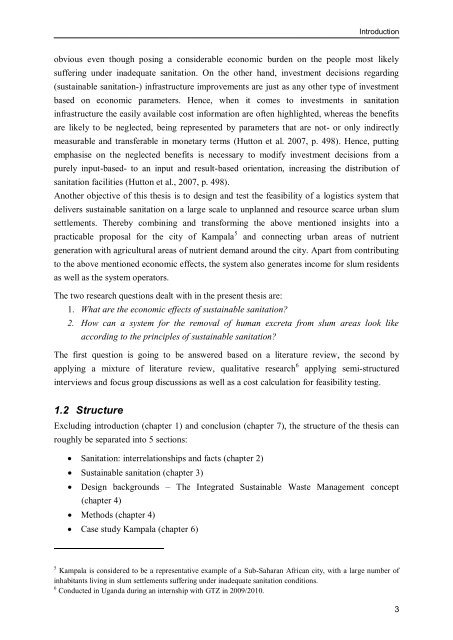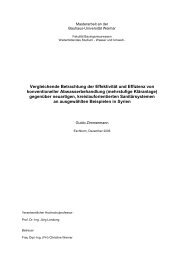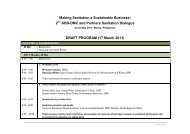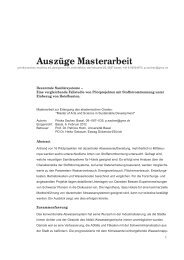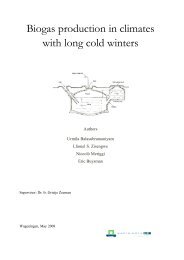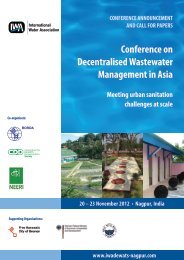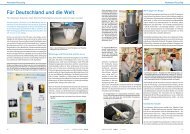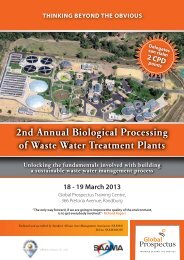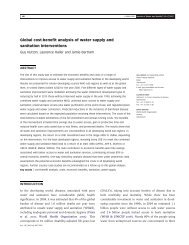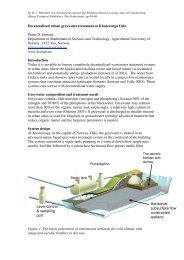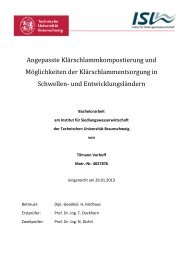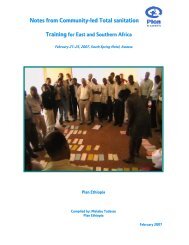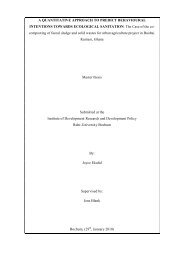Economic Effects of Sustainable Sanitation - SuSanA
Economic Effects of Sustainable Sanitation - SuSanA
Economic Effects of Sustainable Sanitation - SuSanA
You also want an ePaper? Increase the reach of your titles
YUMPU automatically turns print PDFs into web optimized ePapers that Google loves.
Introduction<br />
obvious even though posing a considerable economic burden on the people most likely<br />
suffering under inadequate sanitation. On the other hand, investment decisions regarding<br />
(sustainable sanitation-) infrastructure improvements are just as any other type <strong>of</strong> investment<br />
based on economic parameters. Hence, when it comes to investments in sanitation<br />
infrastructure the easily available cost information are <strong>of</strong>ten highlighted, whereas the benefits<br />
are likely to be neglected, being represented by parameters that are not- or only indirectly<br />
measurable and transferable in monetary terms (Hutton et al. 2007, p. 498). Hence, putting<br />
emphasise on the neglected benefits is necessary to modify investment decisions from a<br />
purely input-based- to an input and result-based orientation, increasing the distribution <strong>of</strong><br />
sanitation facilities (Hutton et al., 2007, p. 498).<br />
Another objective <strong>of</strong> this thesis is to design and test the feasibility <strong>of</strong> a logistics system that<br />
delivers sustainable sanitation on a large scale to unplanned and resource scarce urban slum<br />
settlements. Thereby combining and transforming the above mentioned insights into a<br />
practicable proposal for the city <strong>of</strong> Kampala 5 and connecting urban areas <strong>of</strong> nutrient<br />
generation with agricultural areas <strong>of</strong> nutrient demand around the city. Apart from contributing<br />
to the above mentioned economic effects, the system also generates income for slum residents<br />
as well as the system operators.<br />
The two research questions dealt with in the present thesis are:<br />
1. What are the economic effects <strong>of</strong> sustainable sanitation?<br />
2. How can a system for the removal <strong>of</strong> human excreta from slum areas look like<br />
according to the principles <strong>of</strong> sustainable sanitation?<br />
The first question is going to be answered based on a literature review, the second by<br />
applying a mixture <strong>of</strong> literature review, qualitative research 6 applying semi-structured<br />
interviews and focus group discussions as well as a cost calculation for feasibility testing.<br />
1.2 Structure<br />
Excluding introduction (chapter 1) and conclusion (chapter 7), the structure <strong>of</strong> the thesis can<br />
roughly be separated into 5 sections:<br />
<strong>Sanitation</strong>: interrelationships and facts (chapter 2)<br />
<strong>Sustainable</strong> sanitation (chapter 3)<br />
Design backgrounds – The Integrated <strong>Sustainable</strong> Waste Management concept<br />
(chapter 4)<br />
Methods (chapter 4)<br />
Case study Kampala (chapter 6)<br />
5 Kampala is considered to be a representative example <strong>of</strong> a Sub-Saharan African city, with a large number <strong>of</strong><br />
inhabitants living in slum settlements suffering under inadequate sanitation conditions.<br />
6 Conducted in Uganda during an internship with GTZ in 2009/2010.<br />
3


